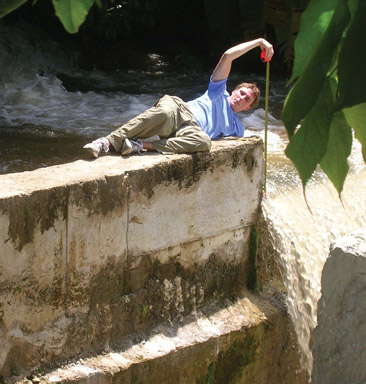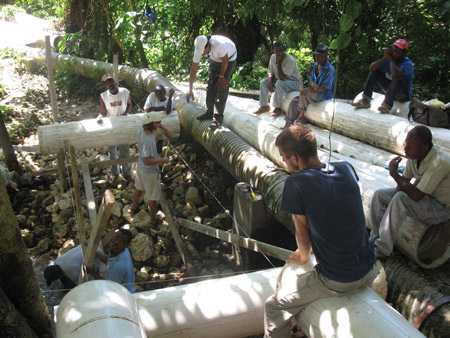water for Cange
Thomas Larrew
Clemson Engineers for Developing Countries help bring clean water to thousands of Haitians.
A few years ago the people of Cange, Haiti, needed water. Some of them had to walk a thousand feet down the mountain and climb back up lugging forty-pound buckets. Today, a new system pipes clean water up the mountain and into Cange. A team of Clemson students, working with Haitian partners, helped make it happen.
Clemson Engineers for Developing Countries (CEDC) began in the fall of 2009, when seven students in civil engineering noticed that something was missing from their curriculum.
“We wanted to take our technical skills outside of the classroom to gain real-world experience,” says Jeff Plumblee, a Ph.D. candidate who is one of the founding members and program director of CEDC. “This helped develop our students into better team members, leaders, and more compassionate community members.”
When the team heard that the Episcopal Diocese of Upper South Carolina had a new project to replace the water system of Cange, the students knew it was a perfect fit. This was a project that could teach both collaboration and leadership, and it would test their engineering knowledge and communication skills.
In January 2010, a few months after the project began, an earthquake killed 300,000 Haitians and devastated the lives of more than three million people. In an instant, the water-system project became urgent. Even though Cange did not take a direct hit, most of the hospitals in nearby Port-au-Prince did, and they sent many sick or injured patients to Cange. With the lives of thousands of fellow Haitians in their hands, the people of Cange needed clean water.
A first for Haiti
CEDC designed a system that would filter out large contaminants, kill microbes with ultraviolet radiation and chlorine, and then transport the water through the village in new pipes buried underneath recently paved roads. It would be the first chlorinated municipal water system in Haiti.
The water system now serves 20,000 people. CEDC is installing a second pump to meet the needs of Cange’s growing population and to ensure a supply of water when one of the pumps is down for repair. The system has been so popular that people from the surrounding mountains walk great distances to access Cange’s water.
Meanwhile, CEDC has been growing, moving beyond Cange into Haiti’s Central Plateau. By 2012, CEDC included fifty-two students from multiple disciplines. English students document the work and handle communications with partners and communities. Engineers develop pumping systems, some of them solar-powered, for villages situated uphill from their water supplies. Students in computer science manage the website and document-storage system.
Kaleen Greenwade, an undergraduate engineering student, spent last summer in Haiti pouring concrete, setting rebar, building masonry walls for cisterns, and running a pipe-laying crew. He learned from his Haitian partners how to improvise. “You’re building easy structures, but you’re doing it in a new culture, without the right tools,” he says. “You learn to rely on your partners and work with what you have.”
Wherever they went, the team encountered rugged terrain. “The land in Haiti was mountainous, and the water sources were usually quite a distance from the villages,” recalls Mette Kolind, an undergraduate member of the team. “We had to work up hills, around trees, and through farmland.”
The next step? Make sure the new facilities keep working. The team plans to construct a project-management office in June of 2012 and teach Haitians how to maintain the new water systems. CEDC’s partners have flown several Haitians to the U.S. for training.
A immense impact
But the students are learning as much as their hosts. Katie Wunder, a senior English major who went to Haiti last fall, says Haiti “had an immense impact” on her life.
“Perhaps most moving is realizing and accepting how a life without safe water is standard for them,” she says.
In May 2011 CEDC, which is a part of Creative Inquiry, received a commendation of excellence for service learning from the South Carolina Commission on Higher Education.
Primary faculty advisor is Jennifer Ogle, associate professor of civil engineering; numerous faculty members have contributed. Funding has been provided by Creative Inquiry, Clemson University student government, and the Episcopal Diocese of Upper South Carolina. For more information, visit the CEDC website.
Thomas Larrew is a senior majoring in biochemistry.




